
covid crisis as performative pretext for neurotics and agoraphobes
curing FOMO by making everyone miss out
when even THE ATLANTIC is dunking on the pseudoscience and baseless fear of the branch covidians who, no matter how SAFE they can be made, really truly do not seem to want to go back to normal (or allow anyone else to do so) one might be forgiven for starting to ask some pointed questions about just what is actually going on here.
what, for example, causes formerly balanced (or at least apparently balanced) adult humans to suddenly fall into this, far weirder social valance?
i suspect that it’s because they always wanted to be there. covid just made it possible.
i have a theory and i’m going to term it “neurotic equilibrium.”
let’s define some terms:
at any given time, any given society exists at an equilibrium generated by its underlying characteristics and the forces acting upon it
if you change these characteristics or forces, the equilibrium shifts at the margin. this works just like moving any price. if the price of a car rises from $21k to $22k, all else equal, fewer people will buy one. all behavior works like this.
this is the basis for economics and social sciences: people respond to incentives in predictable ways.
if we then focus upon the “neuroticism/agoraphobic” dimension of this equilibrium, we can see some interesting things when we focus upon the margin (and the margin is where we must focus because this is where change occurs).
for any given level of societal stressors and forces we get a “neurotic equilibrium.” this is the edge of the ability to function socially. on one side of the line are people failing to engage in society and on the other, people managing to do so, but just barely. these are the ones holding on by their fingernails. (this is likely a continuum of manifestations rather than a bright line)
but if we move the stressors and we move the reward structures and modalities of expressing societal virtue, we move the equilibrium. this works in predictable ways.
perhaps the easiest way to look at this is as a choice between two competing goods
going outside, engaging in society, and socializing with other people
staying inside, not engaging in society, and not socializing with other people
each good has a cost and a set of benefits, but not all people experience this the same way. preferences are diverse, idiosyncratic, and endogenous.
what may seem a benefit to one may appear a cost to another. i may LOVE eating dinner in a noisy crowded restaurant. someone else may dislike it and pay to avoid that which i will pay to experience. that’s humanity for you. we’re a varied bunch.
if we add more fear to the system, it will cause people at the margin to drop out of society. this is exactly like saying “if we raise the price of going to disneyland, fewer people will go.” fear acts just like a price mechanism. we have raised the perceived price of going outside and mingling with others by ascribing risk to it and by rendering it illegal/difficult.
if we add more social approval for dropping out of society, it has the effect of lowering the price of dropping out of society. that which was deemed “weird” or “antisocial” previously is now lauded as “virtuous” and “community minded.” behaviors that previously drew criticism now draw plaudits. those who feared being judged for being anti-social need no longer fear it and those who disliked going out but disliked missing out even more (FOMO) no longer need fear the social exclusion of not having “been there” for the fun last weekend. there was nothing to miss.
the confluence of these two forces creates a powerful mover of equilibrium. if the price of “out” rises sharply while the price of “stay home” drops sharply we should expect a large shift in behavior just as we would if the price of beef rose to $200/pound while the price of chicken dropped to 29 cents.
we would also expect this behavior to shift back once the stressors receded and relative pricing reverted to prior levels, but here is where it gets tricky:
not everyone wants that. not everyone liked the old equilibrium.
i never liked the old normal. i don’t want it back.
imagine that you were one of the barely functional, the marginally social. you never really liked going into work, going out with the gang, and being out in crowds owing to some form of agoraphobia or neuroticism.
the challenge is that this same neuroticism also renders you fearful of social judgment. so your (likely quite difficult and painful) personal equilibrium was basically driven by two factors:
FEAR OF GOING OUT
vs
FEAR OF MISSING OUT/CENSURE FOR BEING ANTISOCIAL
this sort of “lesser of evils” view of life choice is a common manifestation of neuroses/insecurity/depression. it’s a pathology. (it also tends to map to the adoption of paternalistic, outcomes oriented progressivism as neurotics seek to have something or someone in control of outcomes)
“i hate this grind but i fear being off it even more, so i keep at it.” “i hate working this hard, but fear losing ground relative to my peers more, so i keep at it.” we all know people like this and the evidence that most humans see well being as relative and not absolute and that they fear the isolation and approbation of having views differing from the “norm” is well established.
this sets up a nasty conflict: i see my well being as relative to yours but fear to pursue that which would actually make me happy because it’s outside social norms and violating social norms makes me unhappy. so all of life becomes balancing fear.
of course such people will, if given pretext, fight to alter social norms: they got what they wanted. it solves a ton of problems for them.
they got to stop going out and to be less seen and less communicative with other humans. the price for staying inside dropped. it may have even flipped signs.
instead of being that lame homebody, they became that “selfless, community minded exemplar of societal virtue.”
their FOMO evaporated because there was nothing to miss out on.
they got to stand far away from you and hide their face and not get called odd.
they got to obsess about hygiene and have it seem warranted.
they do not want to go back. not ever.
they never wanted to be there in the first place. they always feared standing near you. they just feared being seen as odd for not doing so more.
they would always have loved to prevent you from going out, they could just find no way to do so without looking the villain. this gave them one.
do not expect it to be given back willingly.
the problem:
the problem here is that their benefits are our costs and this sets them in opposition to us and seeking to dominate and coerce us in an (at best) zero sum game. (probably a deeply negative sum one)
for them to keep enjoying this lack of FOMO, we must be forced to miss out.
their continued virtue is predicated upon our deprivation.
their comfort is contingent upon our discomfort.
their “new normal happy place” derives from the destruction of our “old normal happy place.”
this means that the new normal happy place is not a nice place.
they seek to mandate this new regime and societal order by force.
the infliction by force of pain and deprivation upon others for one’s own benefit is, at best, antisocial. some might even term it sociopathy.
clearly, no one wants to feel that way about themselves. so they don’t. they sublimate this desire into claims about the world and about society. “risk is high!” and “masks save lives!” and “lockdowns work!” none of which were ever true become the mantras of the folks who do not want to go back. in-group membership and signaling serves to reinforce this and visible signifiers and performative rituals become security blankets.
truth has nothing to do with it. data has nothing to do with it. this is not seeking data and building an opinion, this is serving an emotional need by seizing upon any pretext, no matter how flimsy, to justify it.
it’s selective bias being rationalized as “the science™” because it feels good to do it.
they want the perception of the relative price of “out” to stay crazily high and the social costs for “stay in” to remain low because this drives the equilibrium they prefer and they must do this by force because there is no other way they could do so.
if they were sufficiently self-confident to pursue what actually made them happy on their own, they would have already been doing so. they would have found a job that did not stress them out. they would have said “no thanks” to social invitations and stayed home. they would have no need to limit you to pursue their own best lives.
but, because, at the margin, they were driven by insecurity and FOMO, they could not.
staying home is fine. feel free.
if you want to wear a mask, do it. good luck.
these are your prerogatives.
but when you demand that we all must do the same so you don’t feel bad about about it, you become the bad guy.
when you take from us the liberty to make our own choices and cost/benefit analyses and hamstring our lives and livelihoods just so you can have your neurotic cake and eat it too, you have lost all moral high ground and standing as a member of a social contract.
you become a self-serving oppressor wielding a tantrum like a mace.
you are demanding a “neurocracy,” a government by the most neurotic and seeking to prevent others from enjoying society because you do not.
you are pushing fear and snake oil pseudoscience because it happens to get you the outcome you like as though the fact that you experience my freedom as pain and resentment entitles you to something. it does not.
society does not owe anyone a life free from envy or FOMO. if you have preferences, express them. pursue happiness. but if your pathology demands that others be prevented from pursuing their own so that you may attain yours, do not expect acquiescence.
blinding all because some cannot see is not a basis for any sort of just society or ethical system.
every time we hear the “wow, i kind of liked getting to stay home and not having all the social pressure” or “no, we cannot stop this mitigation i love and you are a fascist for claiming we can!” (which sounds like a hyperbolic straw man until you read the mass media) this is what we’re hearing.
we’re hearing the screams of those who, because they experience our freedom and agency as oppression will seek to oppress us so they they can feel free.
these are not good folks to put in charge.
this is why this deprogramming is going to be so difficult and why so many are going to resist it. it’s why the resistance to it is so political: because those who experience the freedom and agency of others as oppressive select for ideologies that allow them to wield social control and the intersection of progressivism and critical theories dovetail perfectly into authoritarian health initiatives “for your own good.”
but it’s not for your good. it never was. it was for theirs. it was to mollify their emotional needs by taking your freedom for no good reason and asking you to thank them for it. this was those who seek control to alleviate their own fear surging to the fore and seizing control of the levers of power. they are not looking to let them go.
y’all know i love data and digging into it, but we’re getting the point where we’re past that. if you could read data and be convinced by it, you would have been by now.
showing people who are emotionally invested in not letting you have your life back because they like it better this way one more mask study is not going to make them want to show their faces again.
it’s going to make them more determined to keep you from showing yours.
it’s long past time this all stopped and the only way to do that is to actually stop it.
it’s time to get brave and get free. it’s time to stand together and reclaim normal. this has been a derangement of herd animals.
and its 15 minutes are over.




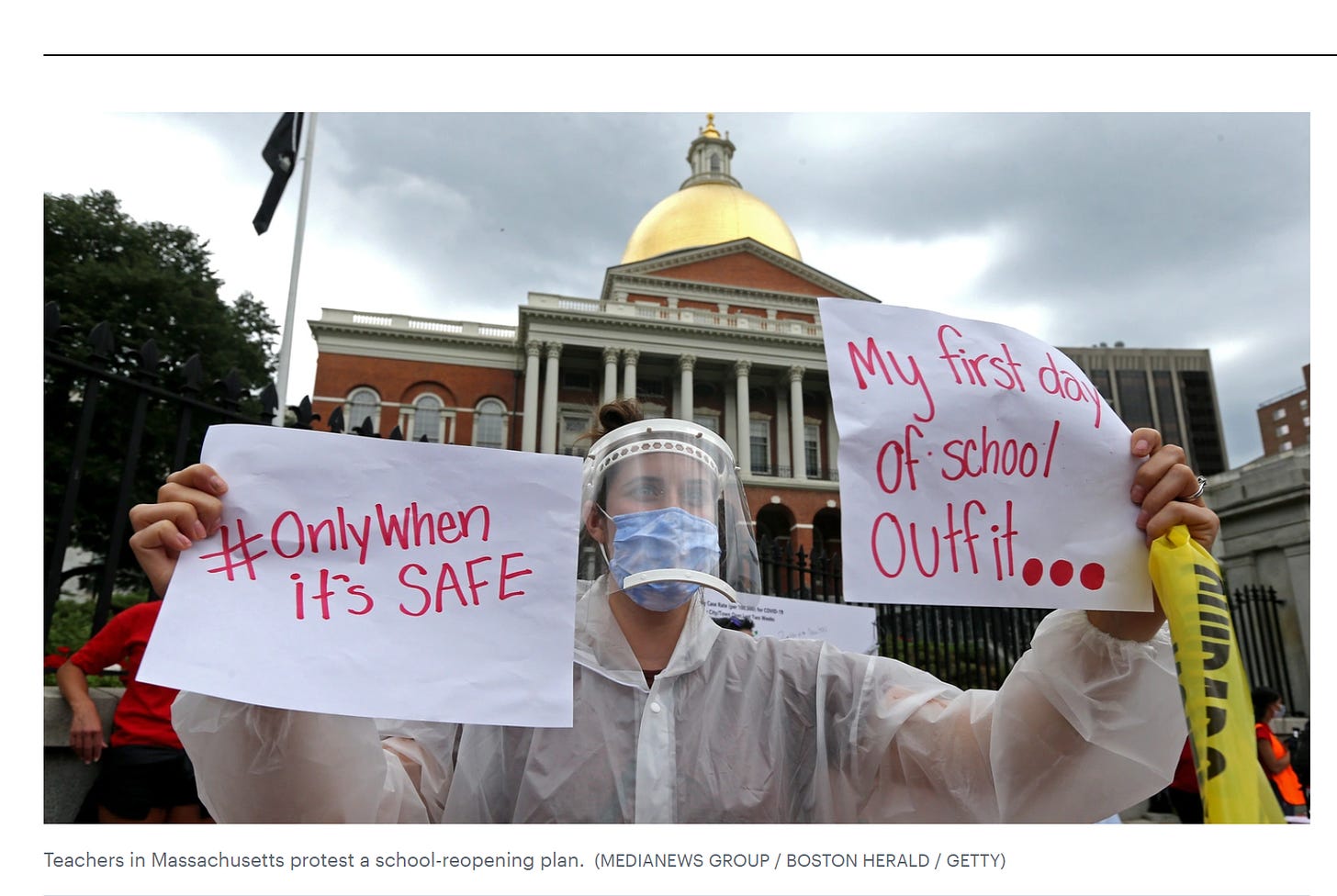

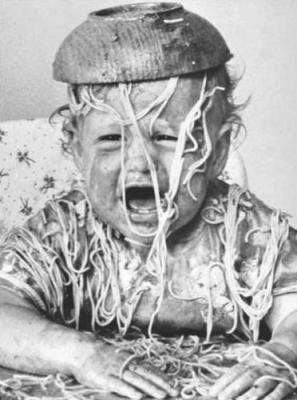
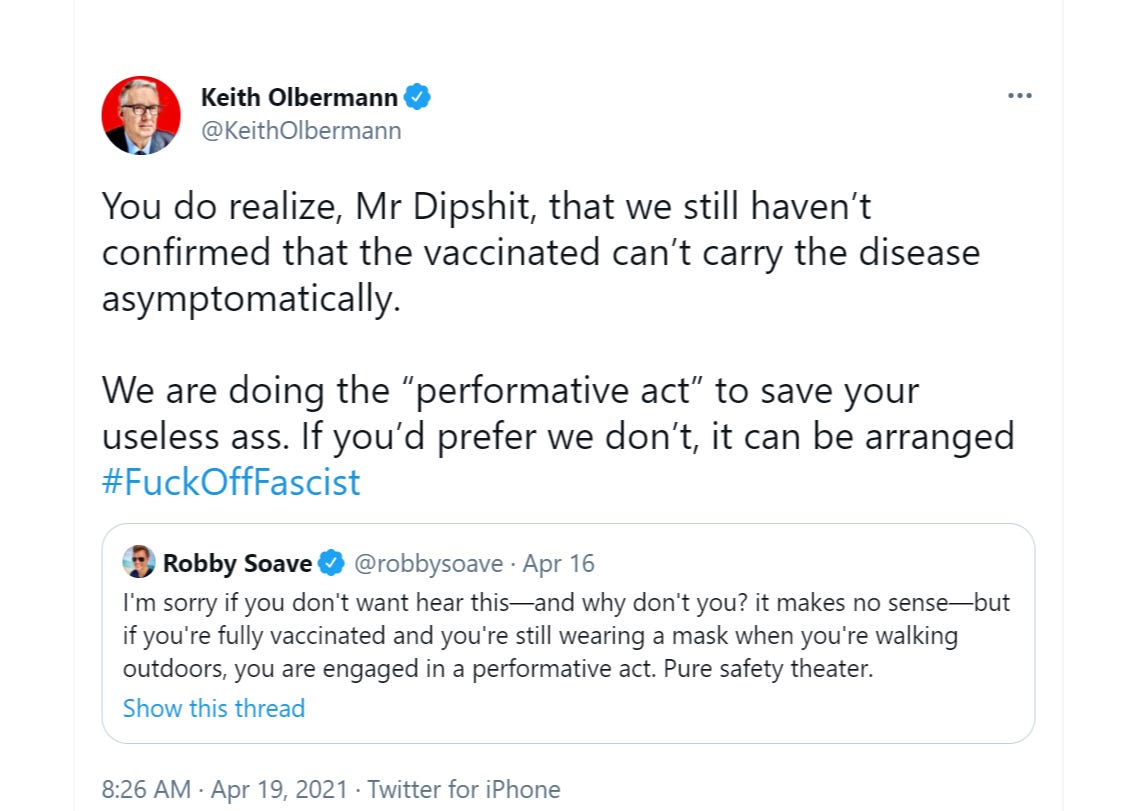
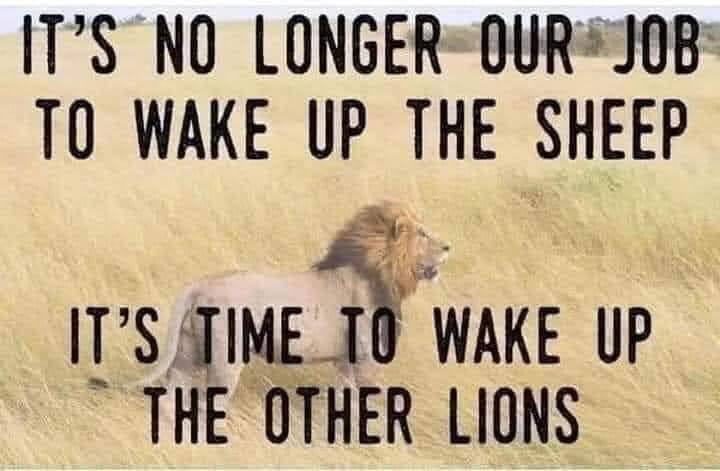



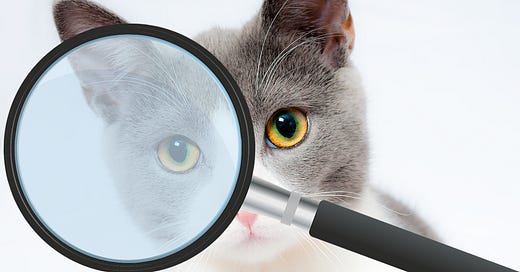

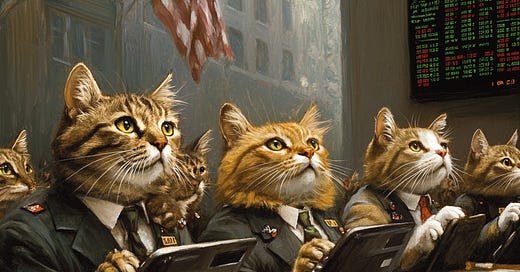


> if they were sufficiently self-confident to pursue what actually made them happy on their own, they would have already been doing so. they would have found a job that did not stress them out.
Gato Psychiatrico - eso es muy bueno.
Interesting to see what parts of society hated their own lives the most, eh?
“My life sucks, I want it to stop - but I don’t want your life to go on either.”
This is the thread we should pull on further.
Yet another thoughtful and insightful piece from a writer rapidly becoming one of the most important and compelling commentators on current American life and times.